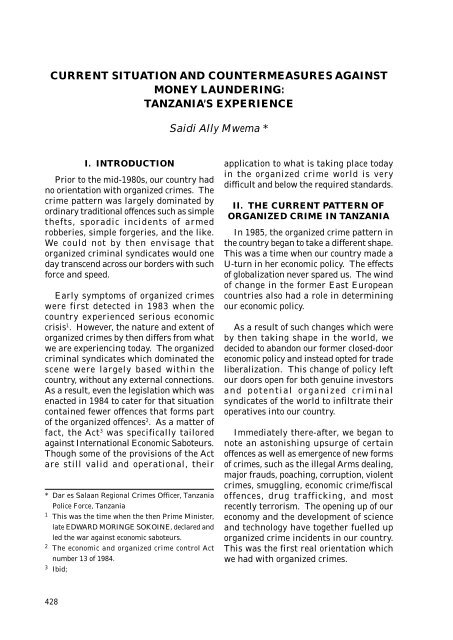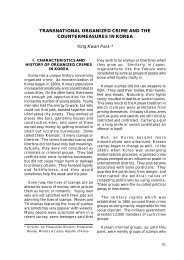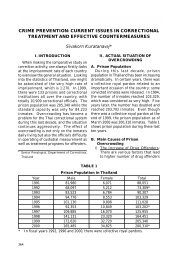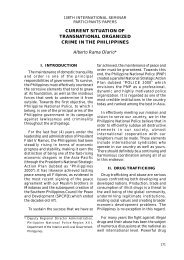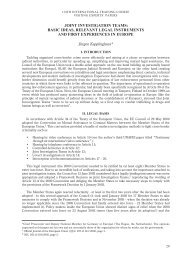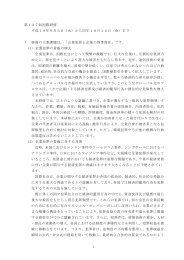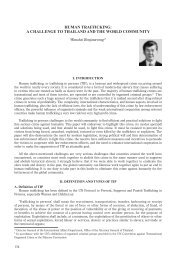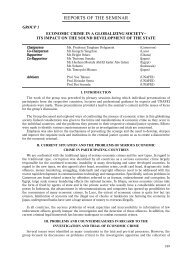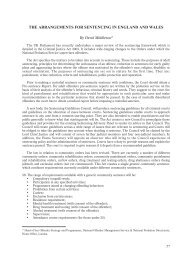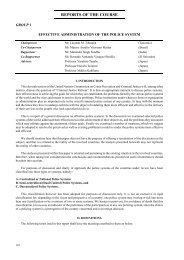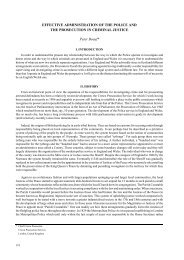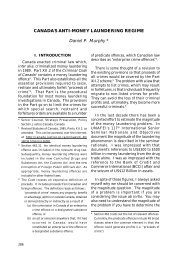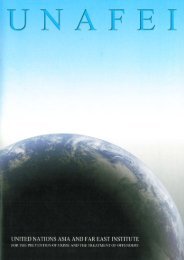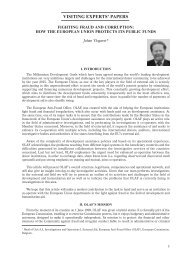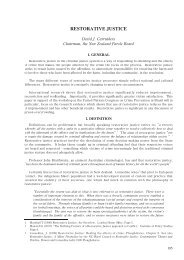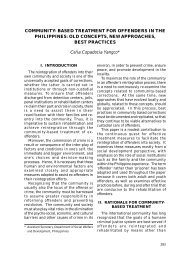Current Situation and Countermeasures against Money Laundering
Current Situation and Countermeasures against Money Laundering
Current Situation and Countermeasures against Money Laundering
You also want an ePaper? Increase the reach of your titles
YUMPU automatically turns print PDFs into web optimized ePapers that Google loves.
RESOURCE MATERIAL SERIES No. 58<br />
CURRENT SITUATION AND COUNTERMEASURES AGAINST<br />
MONEY LAUNDERING:<br />
TANZANIA’S EXPERIENCE<br />
Saidi Ally Mwema *<br />
I. INTRODUCTION<br />
Prior to the mid-1980s, our country had<br />
no orientation with organized crimes. The<br />
crime pattern was largely dominated by<br />
ordinary traditional offences such as simple<br />
thefts, sporadic incidents of armed<br />
robberies, simple forgeries, <strong>and</strong> the like.<br />
We could not by then envisage that<br />
organized criminal syndicates would one<br />
day transcend across our borders with such<br />
force <strong>and</strong> speed.<br />
Early symptoms of organized crimes<br />
were first detected in 1983 when the<br />
country experienced serious economic<br />
crisis 1 . However, the nature <strong>and</strong> extent of<br />
organized crimes by then differs from what<br />
we are experiencing today. The organized<br />
criminal syndicates which dominated the<br />
scene were largely based within the<br />
country, without any external connections.<br />
As a result, even the legislation which was<br />
enacted in 1984 to cater for that situation<br />
contained fewer offences that forms part<br />
of the organized offences 2 . As a matter of<br />
fact, the Act 3 was specifically tailored<br />
<strong>against</strong> International Economic Saboteurs.<br />
Though some of the provisions of the Act<br />
are still valid <strong>and</strong> operational, their<br />
* Dar es Salaan Regional Crimes Officer, Tanzania<br />
Police Force, Tanzania<br />
1 This was the time when the then Prime Minister,<br />
late EDWARD MORINGE SOKOINE, declared <strong>and</strong><br />
led the war <strong>against</strong> economic saboteurs.<br />
2 The economic <strong>and</strong> organized crime control Act<br />
number 13 of 1984.<br />
3 Ibid;<br />
application to what is taking place today<br />
in the organized crime world is very<br />
difficult <strong>and</strong> below the required st<strong>and</strong>ards.<br />
II. THE CURRENT PATTERN OF<br />
ORGANIZED CRIME IN TANZANIA<br />
In 1985, the organized crime pattern in<br />
the country began to take a different shape.<br />
This was a time when our country made a<br />
U-turn in her economic policy. The effects<br />
of globalization never spared us. The wind<br />
of change in the former East European<br />
countries also had a role in determining<br />
our economic policy.<br />
As a result of such changes which were<br />
by then taking shape in the world, we<br />
decided to ab<strong>and</strong>on our former closed-door<br />
economic policy <strong>and</strong> instead opted for trade<br />
liberalization. This change of policy left<br />
our doors open for both genuine investors<br />
<strong>and</strong> potential organized criminal<br />
syndicates of the world to infiltrate their<br />
operatives into our country.<br />
Immediately there-after, we began to<br />
note an astonishing upsurge of certain<br />
offences as well as emergence of new forms<br />
of crimes, such as the illegal Arms dealing,<br />
major frauds, poaching, corruption, violent<br />
crimes, smuggling, economic crime/fiscal<br />
offences, drug trafficking, <strong>and</strong> most<br />
recently terrorism. The opening up of our<br />
economy <strong>and</strong> the development of science<br />
<strong>and</strong> technology have together fuelled up<br />
organized crime incidents in our country.<br />
This was the first real orientation which<br />
we had with organized crimes.<br />
428
117TH INTERNATIONAL SEMINAR<br />
PARTICIPANTS’ PAPERS<br />
III. THE OFFENCE OF MONEY<br />
LAUNDERING<br />
This is part of organized crime offences.<br />
It is very difficult <strong>and</strong> completely out of<br />
perspective to discuss about money<br />
laundering without discussing organized<br />
crimes. <strong>Money</strong> laundering should be<br />
discussed in the context of organized<br />
crimes. This is the reason why we have<br />
directed our attention to organized crimes<br />
in the foregoing paragraphs. Just as it was<br />
with organized crimes, the offence of money<br />
laundering has not yet manifested itself<br />
fully in our system.<br />
There is however a very strong<br />
possibility that the offence has deeply<br />
entrenched itself in our system but owing<br />
to the intricacies involved in its detection<br />
<strong>and</strong> investigation, we have yet to flush it<br />
out. To many of us for example, we used to<br />
associate the offence of money laundering<br />
with illicit drug trafficking only. It took<br />
time before it dawned on us that money<br />
laundering can be facilitated by dirty<br />
incomes derived from all the organized<br />
crime offences.<br />
With those brief foregoing introductory<br />
remarks, let us now examine the current<br />
situation <strong>and</strong> countermeasures that have<br />
been adopted in Tanzania <strong>against</strong> <strong>Money</strong><br />
<strong>Laundering</strong>. In this regard, our discussion<br />
will cover a brief analysis of the current<br />
situation of money laundering <strong>and</strong> the legal<br />
framework for combating such crime; we<br />
shall also explore <strong>and</strong> identify current<br />
problems in the detection, investigation,<br />
prosecution <strong>and</strong> punishment of the said<br />
offenders <strong>and</strong> solutions for them. We shall<br />
finally discuss, albeit briefly, the possibility<br />
of introducing new investigation methods<br />
<strong>and</strong> legislation in the fight <strong>against</strong> money<br />
laundering.<br />
IV. BRIEF ANALYSIS OF THE<br />
CURRENT SITUATION<br />
As mentioned in the introductory part,<br />
the offence of <strong>Money</strong> laundering has not<br />
yet registered itself very firmly in our<br />
system. Perhaps we lack the necessary<br />
skills to detect <strong>and</strong> investigate this offence<br />
or it is non existent. However, we would<br />
like to believe the former to be true because<br />
with the trade liberalization at its peak,<br />
there has been a lot of people from all over<br />
the world coming into the country under<br />
the guise of investors. Due to lack of<br />
adequate skills it has always been difficult<br />
on us to identify non-genuine investors<br />
from the genuine ones.<br />
Being a poor country which welcomes<br />
investments from all over the world,<br />
sometimes it is felt that if you start equiries<br />
<strong>against</strong> the so called investors you risk the<br />
possibility of chasing them away with their<br />
much wanted investments. As a result we<br />
are always in dilemma not knowing the<br />
right course of action to take.<br />
It is partly because of these reasons that<br />
our record of detection is not very<br />
impressive at all. These are however<br />
instances when <strong>Money</strong> <strong>Laundering</strong><br />
activities have been inferred. One such<br />
incident involved the MERIDIAN BIAO<br />
bank which had offices in Tanzania,<br />
Zambia <strong>and</strong> in other countries in the<br />
world 4 . Apart from that case we do not have<br />
any statistics to amplify this situation.<br />
This does not however mean that <strong>Money</strong><br />
<strong>Laundering</strong> is not present in our country.<br />
Most of the emphasis had therefore been<br />
placed in fighting other organized crimes.<br />
4 This bank was opened by suspected criminals from<br />
Malaysia <strong>and</strong> after operating for some time, it<br />
wound up its activities abruptly leaving several<br />
account holders in abeyance. It is believed that<br />
the same happened in Zambia.<br />
429
RESOURCE MATERIAL SERIES No. 58<br />
The legal framework that is in place caters<br />
generally for organized crimes without<br />
specifically addressing the offence of <strong>Money</strong><br />
<strong>Laundering</strong>. Recently, however, emphasis<br />
has been placed on <strong>Money</strong> <strong>Laundering</strong> as<br />
well. Let us now examine the legal<br />
framework in place <strong>against</strong> the offence of<br />
<strong>Money</strong> <strong>Laundering</strong> in Tanzania.<br />
V. THE LEGAL FRAMEWORK FOR<br />
FIGHTING MONEY LAUNDERING<br />
The offence of money laundering has<br />
always been discussed in the context of<br />
organized crime. For a long time in our<br />
country, there were no specific legal<br />
frameworks to deal with money laundering<br />
as a separate offence. The tendency has<br />
always been to resort to various legal<br />
provisions in place <strong>against</strong> organized<br />
crimes. We therefore intended to highlight<br />
some registration put in place <strong>against</strong><br />
organized crime which also somehow caters<br />
for the offence of money laundering.<br />
A. Legislation Against Organized<br />
Crime<br />
When traces of organized crime began<br />
to be felt in Tanzania, organized crime had<br />
not yet assumed the international<br />
character it has now. As such, the<br />
legislation enacted was mainly aimed at<br />
combating what was considered a group of<br />
local economic saboteurs <strong>and</strong> other local<br />
organized criminal gangs 5 .<br />
Prior to the enactment of this legislation,<br />
there were of course, two United Nations<br />
conventions <strong>against</strong> Narcotic drugs <strong>and</strong> the<br />
other <strong>against</strong> psychotropic substances.<br />
These conventions adopted a number of<br />
resolutions aimed at controlling narcotic<br />
drugs <strong>and</strong> psychotropic substances which<br />
by then were the leading organized crimes.<br />
It was envisaged, correctly, that other<br />
5 The economic <strong>and</strong> organized crime control Act,<br />
Number 13 of 1984.<br />
forms of organized crimes derive their<br />
origins from the illicit trade <strong>and</strong> abuse of<br />
dangerous drugs.<br />
Apart from the two United Nations<br />
conventions, two legislations were also<br />
enacted in 1965 <strong>and</strong> 1969 respectively 6 .<br />
Though they were not expressly dealing<br />
with organized crime directly, they were<br />
intended to facilitate the extradition of<br />
criminals <strong>and</strong> to follow in hot pursuit,<br />
though special arrangements with other<br />
countries, all those people who commit<br />
crimes in one country <strong>and</strong> run to another<br />
country. It was envisaged, again correctly,<br />
that the existence of such legislation would<br />
deter potential offenders from organizing<br />
their criminal schemes in one country <strong>and</strong><br />
run to seek refuge <strong>and</strong> reap fruits of their<br />
criminal acts in another country when<br />
things turn sour in their countries.<br />
As started earlier, the best weapon that<br />
the Tanzanian Government thought would<br />
help wipe out or control incidents of<br />
organized crime, is the Economic <strong>and</strong><br />
Organized Crime Control Act 7 . This Act<br />
was enacted in 1984 when the first real<br />
adverse effects of organized crime began<br />
to bite. The promulgation of this Act was<br />
aimed at making better provisions for the<br />
control <strong>and</strong> eradication of certain crimes<br />
<strong>and</strong> culpable non-criminal misconduct<br />
through the prescription of modified<br />
investigation <strong>and</strong> trial procedures, <strong>and</strong> new<br />
remedies <strong>and</strong> for connected matters. A<br />
number of new offences were created <strong>and</strong><br />
enshrined in the first schedule of that Act.<br />
One such offence is that of “Leading<br />
Organized Crime” 8 . In the following part<br />
we wish to discuss briefly some of the<br />
provisions of the Act which criminalizes<br />
money laundering.<br />
6 The extradition Act of 1965 <strong>and</strong> the fugitive<br />
offenders (pursuit) Act of 1969.<br />
7 No. 13 of 1984.<br />
8 Ibid; paragraph 4(1) of the first schedule to the Act.<br />
430
117TH INTERNATIONAL SEMINAR<br />
PARTICIPANTS’ PAPERS<br />
B. The Economic And Organized<br />
Crime Control Act, Number 13 of<br />
1984<br />
Part III of the Act covers the procedure<br />
<strong>and</strong> regulation governing the investigation<br />
<strong>and</strong> prosecution of economic cases.<br />
Organized crimes (including money<br />
laundering) falls within the ambits of this<br />
part. Under the provision of the Act, the<br />
investigation of all economic offences<br />
reported to the Police shall be conducted<br />
by Police Officers, with the assistance of<br />
such public officials as may be designated<br />
by the Director of Public Prosecutions after<br />
consultation with the Director of Criminal<br />
Investigation <strong>and</strong> by order published in<br />
Gazette 9 .<br />
The act also empowers a Police Officer<br />
to conduct search <strong>and</strong> seize property<br />
involved in an economic forfeiture or<br />
confiscation of a property proved to have<br />
been involved in the commission or<br />
facilitation of an economic offence 10 .<br />
Transfer of advantage or property involved<br />
in or arising out of the commission by any<br />
person of an economic offence is prohibited<br />
by the Act 11 .<br />
However, when one reads the above<br />
provisions of law between the lines, he will<br />
notice that they do not provide anything<br />
specific in relation to the money laundering<br />
offence but rather they provide for<br />
organized crimes in general. Absence of<br />
specific legal provisions that ciminalizes<br />
money laundering creates loop-holes in our<br />
legal systems which assists organized<br />
criminal gangs to thrive <strong>and</strong> flourish.<br />
This helpless situation led many<br />
countries to introduce legislative initiatives<br />
regarding money laundering <strong>and</strong><br />
confiscation of the proceeds of crime. In<br />
act it was the United Nations convention<br />
which appealed to <strong>and</strong> m<strong>and</strong>ated member<br />
countries to adopt a model with acceptable<br />
st<strong>and</strong>ards. In the following part, we wish<br />
to discuss briefly about the directive of the<br />
United nations <strong>and</strong> the impact it had on<br />
our country in formulating the required<br />
legislation <strong>against</strong> money laundering.<br />
C. The United Nations Convention<br />
As we are all aware, the United Nations<br />
in many of its deliberations, convened a<br />
conference in Vienna, Austria. 12 The<br />
conference came up with a very famous<br />
convention <strong>against</strong> Illicit Traffic in Narcotic<br />
Drugs <strong>and</strong> Psychotropic Substances. The<br />
conference also came up with a model draft<br />
to be adopted by all member countries in<br />
order to intensify the war <strong>against</strong><br />
organized crimes <strong>and</strong> especially illicit<br />
traffic in narcotic drugs which in most cases<br />
brews up other forms of organized crimes.<br />
The objectives of such model draft were/<br />
are to enable different countries of the<br />
world to unify their strengths in order to<br />
fight <strong>and</strong> eradicate organized crime<br />
syndicates more collectively.<br />
Tanzania, being a member of the United<br />
Nations, adopted into her legal system the<br />
proposed model <strong>and</strong> enacted two legislation<br />
almost simultaneously, the Mutual<br />
Assistance in Criminal Matters Act 13 <strong>and</strong><br />
the Proceeds of Crime Act 14 . These<br />
legislation are of unique importance as they<br />
call for Agreements to be made between<br />
states with regard to mutual assistance in<br />
a variety of activities related to the<br />
investigation of crime such as; collection<br />
of evidence, location of witnesses or<br />
suspects, service for search <strong>and</strong> seizure of<br />
12 Ibid; section 58(1).<br />
9 Ibid; section 21(1).<br />
10 Ibid; section 22.<br />
11 Ibid; section 23.<br />
13 In 1988.<br />
14 Number 24 of 1991 <strong>and</strong> number 25 of 1991,<br />
respectively.<br />
431
RESOURCE MATERIAL SERIES No. 58<br />
stolen property etc, just to mention a <strong>and</strong><br />
seizure of stolen property etc, just to<br />
mention a few 15 . Let us now examine the<br />
appropriate legal provisions in these two<br />
Acts which criminalizes money laundering.<br />
D. The Proceeds of Crimes Act,<br />
Number 25 of 1991.<br />
This Act was designed to introduce a new<br />
law fashioned to provide the most effective<br />
weaponry so far <strong>against</strong> major crimes. Its<br />
purpose, according to the bill sent to<br />
parliament for debate 16 , is to strike at the<br />
heart of major organized crimes by<br />
depriving persons involved of the profits<br />
<strong>and</strong> instrumentalities of their crimes. By<br />
so doing, it was envisaged that the Act will<br />
suppress criminal activity by attacking the<br />
primary motive, profit, <strong>and</strong> prevent<br />
reinvestment of that profit in further<br />
criminal activities. Generally speaking,<br />
the Act contains provisions of a coordinated<br />
international effort designed to target both<br />
the pushers <strong>and</strong> others involved in criminal<br />
activities as well as those who reap the<br />
most reward from such crimes.<br />
This Act also provides a mechanism for<br />
the tracing, freezing <strong>and</strong> confiscation of the<br />
proceeds of crime such as drug trafficking 17 .<br />
It also confers on Police new powers to<br />
assist in following the money trail 18 .<br />
Furthermore, the Act creates a few new<br />
offences such as money laundering <strong>and</strong><br />
organized fraud 19 .<br />
The Proceeds of Crime Act 20 when taken<br />
together with the Mutual Assistance in<br />
15 Section 4 of the mutual assistance in criminal<br />
matters Act, 1991.<br />
16 Bill for proposed enactment of a law <strong>against</strong><br />
proceeds of crime.<br />
17 Section 9 of the Proceeds of Crime Act, number 25<br />
of 1991.<br />
18 Ibid; section 31(3).<br />
Criminal Matters Act, enables freezing <strong>and</strong><br />
confiscation orders made by courts in our<br />
country to be enforced abroad. Likewise,<br />
they enable orders made in foreign<br />
countries in relation to foreign offences to<br />
be enforced <strong>against</strong> assets located in<br />
Tanzania.<br />
VI. CURRENT PROBLEMS IN THE<br />
DETENTION, INVESTIGATION,<br />
PROSECUTION AND PUNISHMENT<br />
OF MONEY LAUNDERING<br />
OFFENDERS<br />
A. Detection<br />
This is the key to the dismantling of<br />
organized criminal syndicates. Without<br />
detection, it is impossible to apprehend <strong>and</strong><br />
prosecute perpetrators of this crime.<br />
Detection however, requires special skills<br />
<strong>and</strong> knowledge of how this offence is<br />
committed. The investigators have a duty<br />
of sharpening their detection skills by updating<br />
themselves on methods of<br />
laundering cash that have been used to<br />
convert dirty cash into clean assets. Once<br />
investigators are able to distinguish<br />
various techniques employed by the<br />
offenders of this crime, detection becomes<br />
an easy task.<br />
With increasing globalization <strong>and</strong><br />
liberalization, countries, especially<br />
developing ones, are vulnerable to the risks<br />
of money laundering. Therefore,<br />
appropriate detection strategies ought to<br />
be put in place in order to discourage<br />
offenders of money laundering offence from<br />
entrenching their roots into our countries.<br />
As stated earlier, our records on<br />
criminalizing money laundering in<br />
Tanzania is not very impressive. The<br />
logical assumption is that our detection<br />
strategies are not well advanced. We<br />
highly appreciate invitations to forums like<br />
19 Section 71 of the proceeds of crime Act, Part VII. 20 Number 25 of 1991.<br />
432
117TH INTERNATIONAL SEMINAR<br />
PARTICIPANTS’ PAPERS<br />
this because we are sure to learn something<br />
useful which can improve detection of<br />
money laundering in our country.<br />
With the development in technology, for<br />
example electronic cashing through<br />
internet, organized criminal gangs can now<br />
move large sums of money easier from one<br />
part of the world to another. This has<br />
somehow substantially reduced the<br />
importance of national borders thus<br />
allowing international criminals to finance,<br />
profit from <strong>and</strong> exp<strong>and</strong> their illicit<br />
operation. This therefore requires highest<br />
st<strong>and</strong>ards of detection. This can only be<br />
obtained through training <strong>and</strong> cooperation<br />
from other developed countries or<br />
international agencies.<br />
B. Investigation <strong>and</strong> Prosecution<br />
<strong>Money</strong> laundering investigations are<br />
very complex <strong>and</strong> require specialized<br />
expertise, <strong>and</strong> are normally lengthy<br />
investigations. Many traditional Police<br />
investigative tactics did not include<br />
emphasis on the money, now however,<br />
these investigations are becoming an<br />
essential part of any significant organized<br />
crime investigation.<br />
The problems outlined about detection<br />
can equally be highlighted in the aspect of<br />
investigation. We lack the necessary skills<br />
<strong>and</strong> knowledge of how to successfully<br />
investigate a money laundering case. The<br />
complexity nature <strong>and</strong> the lengthiness of<br />
such investigations calls for well trained<br />
personnel to carry out such tasks. These<br />
persons should be well versed about the<br />
existence of both bilateral <strong>and</strong> multilateral<br />
instruments at their disposal <strong>and</strong> how best<br />
to utilize them to their advantage.<br />
Equally important here, is to impart the<br />
necessary knowledge to the investigators<br />
about the current techniques involving<br />
modern technology in the commission of<br />
this global offence. Lack of such knowledge<br />
would entail failure on our parts because<br />
organized criminals would always be<br />
several steps ahead of us.<br />
Prosecution of this offence also requires<br />
training <strong>and</strong> underst<strong>and</strong>ing of certain<br />
intricacies surrounding this offence.<br />
Designated prosecutors should be picked<br />
<strong>and</strong> trained in the various aspects of money<br />
laundering.<br />
C. Punishment to Offenders<br />
Detection <strong>and</strong> prosecution of offenders<br />
alone is meaningless unless appropriate<br />
punishment is meted out to proved<br />
offenders. Punishment to offenders, as we<br />
all know, serves a number of purposes.<br />
First <strong>and</strong> foremost, it consoles the victims<br />
of the offence, it also teaches a lesson to<br />
the offender <strong>and</strong> more importantly, it acts<br />
as a deterrent to potential criminals.<br />
There is a prevailing belief worldwide<br />
that the more severe a punishment is, the<br />
better. Members of the public would always<br />
be relieved if severe punishment is inflicted<br />
upon proved offenders. This is the reason<br />
why many penal statutes impose<br />
corresponding punishment to various<br />
offences.<br />
In Tanzania, the Penal Code 21 is the<br />
statute which creates most criminal<br />
offences <strong>and</strong> imposes penalties to offenders<br />
of various crimes. However, in so far as<br />
economic cases are concerned, organized<br />
crimes being among them, any person<br />
convicted of an economic offence shall be<br />
liable to imprisonment for a term not<br />
exceeding fifteen years, or to both that<br />
imprisonment <strong>and</strong> any other penal<br />
measure provided for in the respective<br />
Act 22 .<br />
In cases involving money laundering,<br />
imprisonment of whatever term would not<br />
21 Chapter 16 of the revised laws.<br />
433
RESOURCE MATERIAL SERIES No. 58<br />
by itself teach offenders a lesson nor will it<br />
serve as a deterrence to others.<br />
Deprivation of the ill gotten property or any<br />
other proceeds of the crime would equally<br />
be very appropriate <strong>and</strong> would certainly<br />
inflict greater pain to the offender. Since<br />
most of proceeds of money laundering crime<br />
are located far away from where the offence<br />
took place, an appropriate machinery<br />
should be put in place to trace <strong>and</strong> seize<br />
such properties in those countries. This<br />
machinery has been established in<br />
Tanzania by the enactment of two Acts 23 .<br />
However, so far there is no case example<br />
to amplify the application of the provisions<br />
enshrined in those Acts.<br />
VII. POSSIBILITY OF<br />
INTRODUCING NEW<br />
INVESTIGATION METHODS<br />
(INCLUDING NEW LEGISLATION)<br />
IN THE FIGHT AGAINST MONEY<br />
LAUNDERING<br />
In order to win the war <strong>against</strong> offenders<br />
or perpetrators of this offence, deliberate<br />
<strong>and</strong> calculated steps need to be taken in<br />
order to sharpen the investigative skills of<br />
officers concerned <strong>and</strong> also the come up<br />
with a legislation that will iron out all the<br />
existing legal hurdles.<br />
As narrated in the foregoing paragraphs,<br />
criminals of this offence employ very<br />
sophisticated tactics <strong>and</strong> resort to modern<br />
technology in facilitating the conversion of<br />
dirty cash into clean assets. They also use<br />
skilled personnel <strong>and</strong> other professionals<br />
such as Accountants, Lawyers etc. to fend<br />
for them. All these poses a great challenge<br />
to the law enforcers, especially those in<br />
developing countries like Tanzania, who<br />
lack adequate skills, knowledge <strong>and</strong><br />
modern facilities.<br />
This situation is further compounded<br />
from bad to worse by the fact that this<br />
offence is an internationalized one in the<br />
sense that offenders form themselves in<br />
strong organized criminal syndicates. This<br />
set up requires harmonization of different<br />
legal systems <strong>and</strong> global cooperation. No<br />
country the world over can manage to fight<br />
this crime single h<strong>and</strong>edly <strong>and</strong> win. It is<br />
for this obvious reason that we in Tanzania<br />
have supported various Regional <strong>and</strong><br />
International efforts between Law<br />
Enforcement Agencies <strong>and</strong> Other<br />
Institutions, geared at fighting organized<br />
crime <strong>and</strong> particularly money laundering,<br />
collectively. We believe that introduction<br />
of whatever investigation methods or new<br />
legislation would not bring the desired<br />
effect if there is no corresponding collective<br />
Regional or International resolve to tackle<br />
this problem jointly.<br />
The following is therefore an example of<br />
the Regional <strong>and</strong> International cooperation<br />
that exists between us <strong>and</strong> other countries/<br />
institutions <strong>against</strong> organized crimes:<br />
(a) There is the Annual Chiefs of Police<br />
Conference for the three East African<br />
countries where security cooperation<br />
<strong>and</strong> exchange of intelligence<br />
information feature most. Organized<br />
crimes are discussed in this forum<br />
<strong>and</strong> appropriate strategies are set 24 .<br />
This is also supplemented by the<br />
biannual operational drugs meeting<br />
for the Heads of Criminal<br />
Investigation Department <strong>and</strong> Anti-<br />
Narcotic units of the three East<br />
African countries 25 . Within East<br />
African, there is also the East African<br />
Inter-State Defence <strong>and</strong> Security<br />
Sub-Committee which meets<br />
annually to assess the security<br />
22 Economic <strong>and</strong> organized crime control Act, number<br />
13 of 1984, section 59(2).<br />
23 Number 24 of 1991 <strong>and</strong> number 25 of 1991.<br />
24 The countries involved are Kenya, Ug<strong>and</strong>a <strong>and</strong><br />
Tanzania.<br />
25 Ibid; recently Rw<strong>and</strong>a joined as a member.<br />
434
117TH INTERNATIONAL SEMINAR<br />
PARTICIPANTS’ PAPERS<br />
situation within the Region. In all<br />
these forums organized crime is the<br />
main agenda item. As a result of such<br />
cooperation in the Region, the Heads<br />
of states for the east African states<br />
have signed the protocol for<br />
combating illicit drug trafficking <strong>and</strong><br />
money laundering in East Africa 26 .<br />
(b)In the SADC region, in which<br />
Tanzania is one of the member<br />
countries, the Chiefs of Police for<br />
SADC have a forum called<br />
SARPCCO 27 . They meet biannually to<br />
lay strategies to combat organized<br />
crime <strong>and</strong> other cross-border crimes<br />
in the region. A similar protocol as<br />
that in the East African Region was<br />
signed in 1996 for the SADC<br />
countries.<br />
(c) In August 1999 a meeting was<br />
convened in Arusha, Tanzania, to<br />
launch the Eastern <strong>and</strong> Southern<br />
Africa Anti-money laundering group.<br />
In that meeting the ministers<br />
responsible for finance <strong>and</strong> Legal<br />
Affairs from nine countries of our<br />
Region, agreed on a number of points<br />
for action in the region. Among those<br />
points include:<br />
(i) Working towards attainment of<br />
the international st<strong>and</strong>ards in<br />
the fight <strong>against</strong> the laundering<br />
of proceeds of those crimes<br />
referred to in relevant<br />
multilateral agreements <strong>and</strong><br />
initiatives which deal with<br />
combating serious crime, <strong>and</strong> to<br />
implement the 40<br />
Recommendations of the<br />
Financial Action Task Force on<br />
money laundering.<br />
26 This was done Arusha, Tanzania, on 30 th November,<br />
2000.<br />
27 The Southern Africa Regional Police Chiefs<br />
Committee.<br />
(ii) To improve cooperation between<br />
members, <strong>and</strong> with other states,<br />
in the fight <strong>against</strong> money<br />
laundering.<br />
(iii) To co-operate with all relevant<br />
international organizations<br />
concerned with combating<br />
money laundering.<br />
(iv) To study emerging regional<br />
trends in money laundering, <strong>and</strong><br />
to share member states’<br />
experiences in order to address<br />
(v)<br />
those trends.<br />
To institute an evaluation<br />
process, including mutual<br />
evaluation, to assess the<br />
measures in place in each<br />
member state, <strong>and</strong> their<br />
effectiveness, <strong>and</strong> to identify the<br />
gaps between existing measures<br />
<strong>and</strong> endorsed st<strong>and</strong>ards.<br />
(vi) To address deficiencies<br />
identified through the process.<br />
(vii) To develop institutional <strong>and</strong><br />
human resource capacities to<br />
check money laundering.<br />
(d) There is also the INTERPOL. This<br />
body has very much helped to<br />
coordinate a number of activities<br />
between Law Enforcement Agency of<br />
its 178 members. INTERPOL has<br />
provided us with the X-400<br />
communication equipment which<br />
transmits swiftly any information in<br />
a safe <strong>and</strong> secure manner to be used<br />
by the member countries. Recently,<br />
the Interpol Sub-regional Bureau<br />
Office was opened in Nairobi,<br />
Kenya 28 . The Bureau helps to pass<br />
over any information on cl<strong>and</strong>estine<br />
money laundering activities.<br />
It is therefore our considered view<br />
28 Senior Police Officer from Kenya, Tanzania <strong>and</strong><br />
Rw<strong>and</strong>a have already been seconded there.<br />
435
RESOURCE MATERIAL SERIES No. 58<br />
that any new investigation methods<br />
or new legislation envisaged to be<br />
introduced, should take into<br />
consideration efforts being currently<br />
made both within the Region <strong>and</strong><br />
Internationally so as to supplement<br />
such efforts not to contradict them.<br />
VIII. CONCLUSION<br />
concrete <strong>and</strong> appropriate strategies can<br />
embark from. We thus urge other<br />
developed countries <strong>and</strong> International<br />
institutions to emulate the traditional<br />
example set by the organizers of this<br />
seminar <strong>and</strong> attend to the short-falls in the<br />
developing countries in dealing with the<br />
offence of money laundering.<br />
Now, money laundering has firmly<br />
established itself as a major worldwide law<br />
enforcement issue. Apart from the effects<br />
of globalization, trade liberalization <strong>and</strong><br />
development of science <strong>and</strong> technology, our<br />
country is also faced with a large influx of<br />
refugees <strong>and</strong> other displaced people fleeing<br />
the fighting <strong>and</strong> civil strifes in the Great<br />
Lakes Region 29 .<br />
Experience over years has shown that<br />
these people (refugees) engage in<br />
smuggling of firearms, illicit dangerous<br />
drugs <strong>and</strong> other organized offences. Some<br />
of them have also established hidden<br />
properties arising from the proceeds of such<br />
crime <strong>and</strong> others are being used by<br />
organized criminal gangs to invest their illgotten<br />
money in our territory.<br />
On the other h<strong>and</strong>, being a poor country<br />
in dire need for investments, it is very<br />
difficult to draw a line between genuine <strong>and</strong><br />
fake investors. As a matter of practice, we<br />
do not quite often make a follow up or trace<br />
the source of money by such investors. This<br />
in turn diminishes our capabilities in<br />
dealing with this offence.<br />
All in all, the best solution to the money<br />
laundering problem should come from<br />
concerted Regional <strong>and</strong> International<br />
efforts. This seminar for example, is one<br />
of the necessary platforms upon which<br />
29 The wars in the Democratic Republic of Congo, civil<br />
strifes in Rw<strong>and</strong>a <strong>and</strong> Burundi serve as an example.<br />
436


